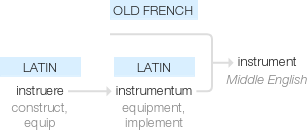Instrument
Middle English: from Old French, or from Latin instrumentum ‘equipment, implement’, from the verb instruere ‘construct, equip’.
wiktionary
From Middle English instrument, from Old French instrument, from Latin īnstrūmentum(“an implement, tool”), From īnstruō(“build, construct; arrange”) + -mentum.
etymonline
instrument (n.)
late 13c., "musical instrument, mechanical apparatus for producing musical sounds," from Old French instrument, enstrument "means, device; musical instrument" (14c., earlier estrument, 13c.) and directly from Latin instrumentum "a tool, an implement; means, furtherance; apparatus, furniture; ornament, dress, embellishment; a commission, authorization; a document," from instruere "arrange, prepare, set in order; inform, teach," literally "to build, erect," from in- "on" (from PIE root *en "in") + struere "to pile, build" (from PIE *streu-, extended form of root *stere- "to spread").
The word in other Germanic languages also is from French. In English the meaning "a means, an agency" is from mid-14c. The sense of "hand-tool, implement, utensil, something used to produce a mechanical effect" is from early 14c. "Now usually distinguished from a tool, as being used for more delicate work or for artistic or scientific purposes" [OED]. The legal meaning "written document by which formal expression is given to a legal act" is from early 15c. Formerly also used of body parts or organs with special functions.
In wyfhode I wol vse myn Instrument As frely as my makere hath it sent. [Chaucer, "Wife of Bath's Prologue"]
